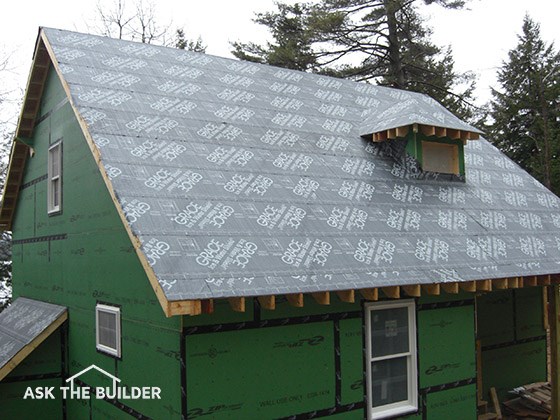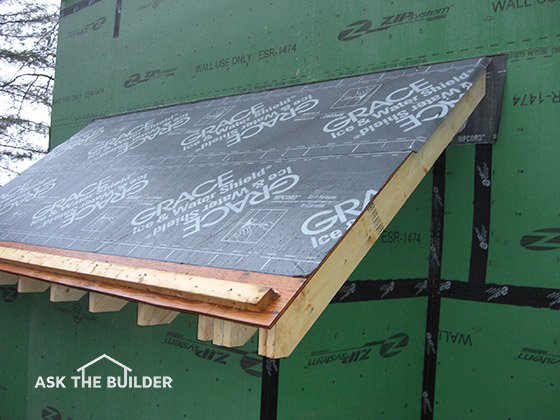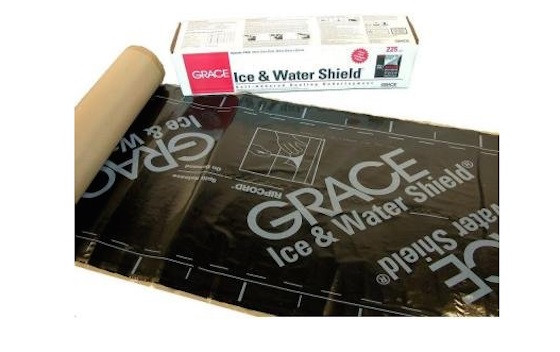Ice And Water Shield

This entire roof has been covered with an ice and water shield. It’s going to be leak-free for many years. © 2018 Tim Carter
"Ice and water shield is a far superior product compared to basic roofing felt paper."
Ice and Water Shield Checklist
- Not all ice underlayments are the same
- When installed correctly all water STOPS
- WATCH my VIDEOS below!
- Cover entire roof in heavy snow areas
- CLICK HERE to Get Tim's FREE & FUNNY Newsletter!
DEAR TIM: Lately I’ve seen roofers install a strange product that looks like traditional felt paper, but it’s not. It has a peel-away backing paper, and this material sticks to the wood sheathing.
Related Links
Ice Dams and Water Shield - DO NOT SHARE - Secret Info
Grace Ice and Water Shield® Benefits
What is it? Why would you use this on a roof? Is it something that can be added to an existing roof in case I’m adding another layer of shingles? Connie G. Columbus, OH
DEAR CONNIE: Without being there, I’m willing to wager that you saw ice and water shield being installed. It’s an amazing roofing product that was introduced in the 1980’s and has quickly become the gold standard for creating leak-free roofs in all climates.
Free & Fast Bids
CLICK HERE to get FREE & FAST BIDS from local roofers who can install the BEST ice and water shield.
What Makes Ice and Water Shield Different?
Ice and water shield is different from felt paper because it's a rubberized membrane that sticks to itself and the wood roof sheathing. It creates a waterproof barrier to standing water if installed correctly.
Felt paper does not stick to anything.
Roofing ice and water shield may look like traditional felt paper, but it’s vastly different in performance. Ice and water shield is a far superior product compared to basic roofing felt paper.
What Does Felt Paper Do?
Traditional felt paper does a decent job at stopping most leaks where water gets under shingles, tiles, metal or slate. It does this by using gravity.
Gravity allows the water to flow over the tar paper down to the edge of the roof. As long as the water doesn't travel horizontally or along the shaft of a roofing nail, the water will not come in contact with the wood beneath the actual roofing material.
How is Felt Paper Installed?
Felt paper is installed so each higher row overlaps the row below. In a perfect world water can't get to the wood roof sheathing.
How Does Felt Paper Allow Leaks?
The overlapping seams of the felt paper can't protect against water that flows BACKWARDS up the roof.
But felt paper has problems where it overlaps the sheet below and where the nails penetrate the felt. If water backs up under the roof as happens with ice damming, water can flow up and under the lap joints of felt paper.
Are the Nail Holes in Felt Sealed?
No. The nail holes through felt paper are not sealed.
Where the nails used to attach the roofing materials penetrate felt paper, the actual hole created by the nail is not sealed where it passes through the felt paper.
Water can get under the head of the nail and seep down the shaft of the nail where it passes through the felt paper. When this happens, you get leaks into your home.

The roofer still needs to install a small strip of the ice and water shield at the lower edge of the roof. He'll do that after removing the 2x4 cleat that prevented him from falling to the ground. © 2017 Tim Carter
What Ingredients are In Ice and Water Shield?
Ice and water shield contains asphalt cement, a special stretchable membrane, and a fancy co-polymer called styrene butadene styrene (SBS).
The SBS component makes the product very sticky.
The ice and water shield roofing material is made with a rubberized asphalt mixture that solves these problems. Because the product has a very sticky backing, it not only adheres well to the wood roofing sheathing, but it also sticks well to the layer below when you overlap the pieces.
Does the Air Temperature Cause Problems During Installation?
Yes, the air temperature, as well as direct sunlight, causes problems when installing ice and water shield.
When the air temperature is above 60 F and the sun is shining on the ice and water shield product, it's extremely sticky. It acts just like contact cement and whatever the sticky side touches, it will not pull off.
You'll have an impossible time pulling it off of anything it touches.
Do Nails Seal with Ice and Water Shield?
Yes, the nail holes through certain brands of ice and water shield do seal. Be sure you get that guarantee in writing before you purchase a product.
When nails penetrate the ice and water shield on the roof, the rubberized nature of the material creates a gasket effect on the shaft of the nail. Leaks simply don’t happen. But not all ice and water shield products offer this!!
What Brand Offers the Nail Hole Guarantee?
The one I used on my own home has this feature and it really works. It's Grace Ice and Water Shield®.

I covered the ENTIRE roof of my New Hampshire house with Grace Ice and Water Shield. I never have to worry about a roof leak - EVER. CLICK THIS IMAGE NOW TO ORDER SOME AND HAVE IT DELIVERED TO YOUR HOME.
Do Other Roofing Products Go Over the Ice and Water Shield?
Ice and water shield products are hidden by the finished roofing materials. Not only does ice and water shield installation stop leaks caused by ice dams, but it also stops leaks created by fierce wind-driven rain.
Does Ice and Water Shield Protect Against Hurricanes?
Yes, ice and water shield will protect your home from leaks caused by hurricanes.
If you live in an area that’s frequented by hurricanes or severe thunderstorms that can drive rain sideways, then you need this material. These storms can easily push water under many finished roofing materials.
CLICK HERE to get FREE & FAST BIDS from local roofers who can install the BEST ice and water shield.
Can I Cover the Entire Roof?
You can cover the entire roof with the ice and water shield, but in many instances, it’s applied where leaks frequently happen. The problem is a leak can occur just about anyplace on a roof for any number of reasons.
How Far Up a Roof Should it Be Installed to Prevent Ice Dam Leaks?
To prevent leaks from ice dams, you may want the product to extend up from the edge of the roof at least 3 feet, but 6 feet is better. I put it over my entire roof because ice dams can form far up a roof.
If the roof has a low slope, you absolutely want to extend the barrier product up the roof quite a distance. I would also apply it in any valleys you may have where two roof planes intersect.
Do You Use It Around Skylights & Flashings?
Ice and water shield is perfect to use around skylights, chimneys, plumbing vents, ventilation caps, or anything that penetrates up through a roof. The roofer laps the material up onto the object and cuts it at corners or curves in a special way to create a leak-proof barrier. Traditional roof flashings then cover this sub-flashing made from the shield product.
Can I Apply It Over Existing Shingles?
No, you can’t apply it on top of the old shingles. You must apply this product as indicated by the manufacturer. Typically you’ll discover that you must apply the material directly to the wood roof sheathing that’s under the shingles and any old felt paper.
Is it Hard to Work With in Hot Weather?
Working with ice and water shield can be challenging, especially in warm or hot weather. In these conditions, the back of the material is very sticky. If you start to unroll it and you’re not aligned correctly, you can install it crooked. If you try to straighten it out, you’ll almost always get a wrinkle.
Be prepared for a slight learning curve when using the material for the first time. If you’re not astute at how it should be installed, by all means read all the tips from the manufacturer and watch any videos they may have about how to best handle the material.
If you’re working on a steep roof, you need to be very careful. Wear all required fall-protection equipment and watch out when stepping on the material if it’s damp, frosty or cold. It can be very slippery. Falling from a roof can really ruin your day. I know, as it’s happened to me on more than one occasion.
Ice and Water Shield VIDEOS:
CLICK HERE to get FREE & FAST BIDS from local roofers who can install the BEST ice and water shield.
Column 861


64 Responses to Ice And Water Shield